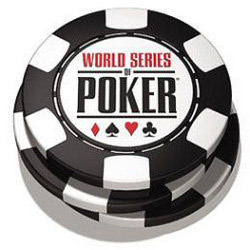Table chat is a long-standing and accepted part of poker, both online and in live card rooms. When playing online, the amount of chatter varies greatly from table to table. Sometimes you will play in virtual silence while other times the chat window will be filled with everything from comments about the previous hand to personal insults to general chatter on topics completely unrelated to the game. It is all part and parcel of playing poker, and many people think it adds to the experience.
But the question is what part should you, as a competitive player looking to maximise their winnings, play in table chat? Should you be at the forefront of it, using table chat to manipulate your opponents? Or should you be silent, letting other players fight the war of the words while you concentrate on the cards? The kop-out here would be to give the stock poker answer of ‘it depends, but this time I’m going to be a little more bold. There is a far more useful answer we can give, a ‘golden rule’ if you like.
Golden rule of table chat – If in doubt, keep quiet!
You will never come to too much harm if you just stay out of table chat completely, so this is a great default rule to play by when you are unsure. While you can sometimes further your aims through table chat, the potential for harm is far greater. Things that seem like innocent chatter may actually be putting you at a significant disadvantage over the long term, especially if you make the same mistake repeatedly. Common slip-ups include:
– Chatting about how you or an opponent played a recent hand and inadvertently giving information about your play to observant opponents.
– Doing the above and managing to ‘educate’ your opponents in the process (sometimes known as being a table professor).
– Berating a weak opponent’s play and prompting them to either improve or leave.
– Chatting when you should be concentrating on the game, causing you to miss important details.
Most of these are small leaks that won’t cost you a lot in expectation individually. On the other hand, if you are a serious offender they might collectively be a significant leak. Chasing bad players off the table is an especially big mistake since it can turn a good table into a bad table almost instantaneously.
Listen up
Those of you who have played live games against a particularly loud or obnoxious opponent have probably wished there was a mute button that they can use to shut them up. Being internet players we have that option. Many sites give the facility to mute individual players and most have the option to turn the chat feature off completely. This is an option that many serious players use, especially those who are worried about falling into one of the traps above. When they can’t see chat, they won’t be tempted to join in and can concentrate on the game. ‘Ignorance is bliss’ I believe the saying goes.
But this deserves some closer scrutiny. Ignorance may indeed be bliss, but at the same time it is still ignorance. While turning off table chat does indeed remove the temptation to get involved, it also prevents you from reading it. Lots of players say things in chat that give you free information you would be foolish to ignore. Of course the information you would really like is details on how they play particular hands. Stuff that you can pretty much copy and paste straight into your notes.
Player X: How could you play 44 from early position?!
Ding! If you’re ever in a pot with Player X and he is in early position you can rule out small pocket pairs from his possible holdings. Okay, so not everything you read is going to be quite so useful as this, but any information is better than none. Even someone saying something as innocuous as ‘I knew you had the ace’ gives you an insight into how that player thinks and on what level.
But this only scratches the surface of what you can learn from table chat. Look deeply into any exchange and you will be surprised how much it can reveal about the players involved. For example imagine you have just sit at the table and hear the following tirade:
Player X: Oh my God Player Y you are awful! How could you call all the way with that garbage and then suck out on me with a runner-runner gutshot? Lucky fish!
Just from that one rant we can deduce the following:
– Player X is not a complete newbie. He knows a bit of poker slang and seems to have at least a rudimentary grasp of strategy.
– On the other hand he is unlikely to be a true shark as he lacks a proper understanding about poker variance and bad beats.
– Player Y is almost certainly a bad player. Loose and probably passive too.
– Player X reacts badly to being sucked out on.
– Player X may be on tilt, or at least be on the verge of it.
– Player X likely now has a vendetta against Player Y
That’s six bits of useful information. You don’t need Poker Tracker when your opponents sit there telling you most of what you need to know for free! Okay so that’s not true, but you see my point.
Even if players don’t give anything obvious away, they might give you clues as to the type of player they are. Players who are excessively chatty are casual players more often than not. Players who show off a lot and try to make themselves heard are most often semi-loose aggressive players who will try to assert their authority on the table. Rocks tend to keep quiet and not participate in table chat for the most part. This is information that you would probably pick up anyway, but you can pick up on stereotypes like this long before you get the hard numbers.
So in short, don’t turn the chat off unless you really can’t trust yourself not to get involved. Be a sponge and absorb as much information from it as you can.
Rules of engagement
So what if you do decide to get involved in table chat? We have already stated that there is no harm in simply saying nothing, but if you do indulge in table chat then it’s best to learn the rules before you do. The best defense against drowning is not to fall in the water, but learning to swim isn’t bad either.
Generally speaking there are two negative results you want to avoid when participating in table chat. Firstly you want to avoid getting so involved in the chat that you will lose concentration on the game and miss important information. For this reason you should keep idle chatter (such as discussing last nights football scores) to a minimum and preferably restrict it to when you are not involved in the hand. Naturally this is even more important when you are multi-tabling, as you will have little enough time to make decisions anyway.
The second problem is if what you say in the chat window will do your cause more harm than good. It is vital that when you say anything you think before you speak. You wouldn’t bet, call, fold or raise without thinking about the consequences so do the same courtesy to your table chat as well. Be mindful of the words of the physician Hippocrates:
First, do no harm
Don’t discuss the pros and cons of a particular play, don’t say anything that will give astute opponents information to use against you and certainly don’t say anything that will encourage a bad player to improve or leave the table. Unfortunately as we illustrated above, it is easy to give things away without really saying much, which is what makes the golden rule so pertinent.
Possible Exceptions to the Golden Rule
I am such a firm believer in the golden rule that if I were banned from chatting on every online poker site it wouldn’t bother me much at all. I am convinced that most of what you say in the chat box will do more harm than good, whether this is because it directly harms your cause or because it simply diverts your attention from more important matters.
However, there are very few absolute answers in poker and I will grudgingly admit that there are times when, if you say the right thing, it might work in your favour. Below are three examples where you might gain an advantage through table chat.
Projecting a false image
Sometimes you can use the chat box to provide false clues as to what type of player you are. Try to delude players into thinking that you are a loose, casual, passive, drunk or otherwise fishy player and hope they are so taken in by your charade they don’t notice that your image doesn’t match your play style.
You have to be a good actor to pull this off, because if your act looks in the slightest bit suspicious, you will achieve exactly the reverse of what you intend. Nothing makes me more suspicious than a player who sits down with a handle like ‘i_never_fold’ and then opens by saying ‘I hope you guys are ready to gamble’ in the chat box.
Protecting weak players
If berating and educating weak players is such a bad idea, then what about encouraging them, making them feel welcome and protecting them from table professors and nits who are not as savvy as you? This is certainly a noble cause and I will confess that schmoozing poor players probably makes up 90% of what I say in the chat window. Sometimes this is simple words of encouragement or commiseration, but if there is a table professor or an obnoxious know-it-all insulting a weak player then it can be a good idea to enter the argument on the side of the weak player. Your goal should be to divert Mr know-it-all’s attention to you rather than the weak player.
Of course, trying to play sheriff at the table is very hit and miss. You have to sound sincere and even then you don’t always get a unanimously good result. Sometimes the bad player will leave anyway. Sometimes he will stay but the villain will continue his jibes. Sometimes the bad player doesn’t give a damn what the other guy thought anyway so your efforts were unneeded. And all this time you are typing in the chat box rather than paying attention to the game.
Tilting your opponents
If you really have the gift of the gab, then you might want to try tilting your opponent through the chat window. Generally speaking this will be an opportunistic thing rather than something you can set out to do from the start. You need to identify a player who seems to be on the brink of tilting anyway and give them a push. I can’t really give you much more information than this because firstly it is situation dependent and secondly it’s not something I am very good at myself.
I will say that I am against some of the nastier things that are said in the name of trying to tilt your opponents. Sure, we are playing poker and trying to take each other’s money, but there comes a time when disrespecting your opponent and the game for a tiny bit of expectation is just not worth it. I would rather focus my efforts on taking their money legitimately. If you are someone who thrives in getting under people’s skin, then you probably don’t need me to tell you how to do it anyway.
There may be other examples of how you can advance your cause through chat, I’ll leave you to explore them yourself if you would like. Personally I’m going to sit back and rely on the golden rule.
Good luck at the tables.
Ian Taylor “Piemaster”
Submit your review | |





